You’ve probably heard someone say that your heart stops when you sneeze, and maybe you’ve even felt a strange flutter in your chest during a particularly powerful achoo. This common belief has been passed down for generations, leaving many people wondering if their sneezing fits are actually dangerous to their cardiovascular health.
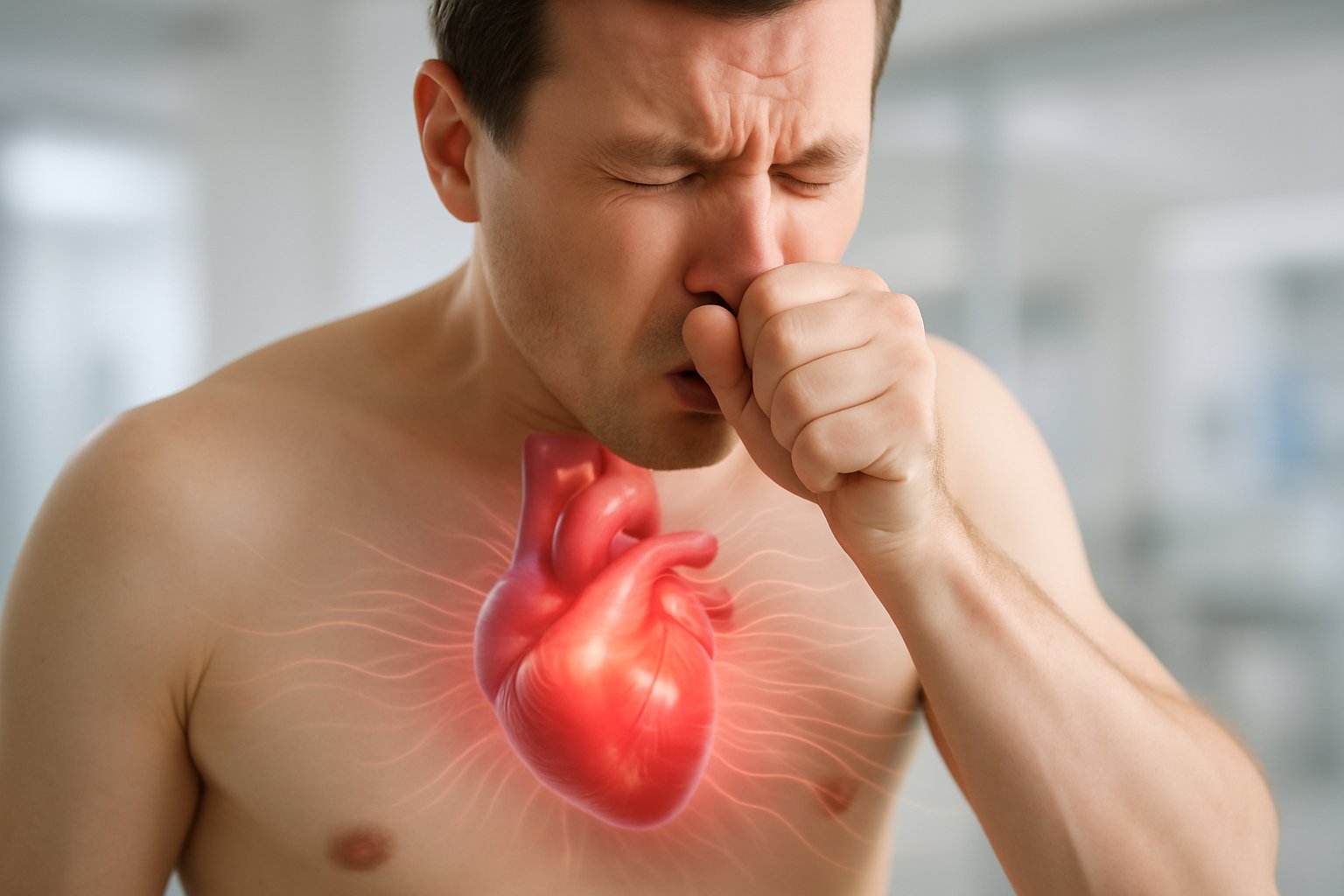
Your heart does not actually stop when you sneeze, but it may briefly change its rhythm due to pressure changes in your chest. While sneezing can cause temporary fluctuations in heart rate and blood flow, the heart continues pumping throughout the entire sneezing process[1] without any real interruption to its electrical activity.
Understanding what really happens during a sneeze can help put your mind at ease and separate medical fact from fiction. The relationship between sneezing and your heart involves fascinating physiological processes that demonstrate just how interconnected your body systems truly are.
Key Takeaways
- Sneezing causes temporary changes in chest pressure that may alter heart rhythm but does not stop the heart
- The myth about heart stoppage during sneezing stems from brief rhythm changes that people can sometimes feel
- Rare complications like sneeze syncope can occur but are extremely uncommon and usually involve underlying medical conditions
What Actually Happens to Your Heart When You Sneeze

When a person sneezes, their heart experiences temporary changes in rhythm and blood flow due to increased chest pressure and nerve signals. The heart doesn’t actually stop during sneezing[1], but it does undergo brief alterations that can feel noticeable.
Pressure Changes in the Chest
During a sneeze, the chest cavity experiences dramatic pressure shifts that directly affect heart function. The person takes a deep breath, then forcefully contracts their diaphragm and chest muscles while temporarily closing their airway.
This action creates intense pressure buildup in the chest cavity. The increased pressure compresses blood vessels and temporarily reduces the amount of blood returning to the heart.
Key pressure effects include:
- Reduced blood flow back to the heart
- Compressed blood vessels in the chest
- Temporary changes in heart filling capacity
When the sneeze releases, pressure drops quickly. Blood flow returns to normal patterns, and the heart adjusts its pumping rhythm accordingly.
The entire pressure cycle lasts only seconds. Most people experience no lasting effects from these brief pressure changes.
Heart Rate Variations During Sneezing
Heart rate changes during sneezing[2] occur as the cardiovascular system responds to the physical stress of the sneeze reflex. The heart may briefly slow down or skip a beat, but it continues pumping throughout the process.
These variations happen in phases. Initially, heart rate may increase as the body prepares for the sneeze. During the actual sneeze, the heart rate often decreases temporarily.
Common heart rate patterns:
- Initial increase before sneezing
- Brief decrease during the sneeze
- Quick return to normal rhythm
The changes feel more dramatic than they actually are. Most heart rate variations last less than a few seconds and pose no health risks to healthy individuals.
Some people notice their heart “skipping a beat” when they sneeze. This sensation results from the temporary rhythm disruption rather than an actual pause in heart function.
Role of the Vagus Nerve
The vagus nerve plays a central role in heart changes during sneezing by transmitting signals between the brain and cardiovascular system. This nerve helps regulate both heart rate and the sneeze reflex itself.
When sneezing occurs, vagal tone increases[1] and can slow the heart rate temporarily. The vagus nerve essentially tells the heart to briefly adjust its rhythm during the intense physical action of sneezing.
Vagus nerve effects:
- Coordinates sneeze response
- Regulates heart rate changes
- Maintains cardiovascular stability
The nerve ensures the heart adapts appropriately to the physical demands of sneezing. It prevents dangerous rhythm disruptions while allowing normal physiological responses.
This nerve communication happens automatically. The person doesn’t consciously control these heart rate adjustments during sneezing episodes.
Debunking the Myth: Does Your Heart Stop When You Sneeze?

The widespread belief that your heart stops when you sneeze is completely false, though the physical sensations during a sneeze can create this illusion. Scientific evidence from cardiology shows that while sneezing affects heart rhythm temporarily, the heart never actually stops beating.
Origin of the Heart Stop Myth
The myth that your heart stops when you sneeze[3] likely stems from the unusual sensations people feel during sneezing. Many people notice a brief pause or flutter in their chest when they sneeze.
This feeling happens because sneezing creates sudden pressure changes in the chest cavity. The diaphragm contracts forcefully, which can compress the heart slightly.
These physical changes create a noticeable sensation that feels like the heart has paused. People naturally assumed their heart must have stopped beating for a moment.
The myth spread over generations through word of mouth. Without modern medical knowledge about human physiology, this explanation seemed logical to most people.
Common beliefs about sneezing and the heart:
- Heart stops completely during a sneeze
- Saying “bless you” helps restart the heart
- Multiple sneezes are more dangerous
- People with heart problems should avoid sneezing
What Science Reveals
Medical research clearly shows that your heart does not stop when you sneeze[1]. Advanced monitoring equipment can track heart activity during sneezing episodes.
The heart’s pacemaker, called the sinoatrial node, continues sending electrical signals throughout the entire sneeze. These signals keep the heart pumping blood without interruption.
Sneezing can cause changes in chest pressure that affect heart rate[2], but the heart muscle itself keeps working. The rhythm may briefly change, but it quickly returns to normal.
What actually happens during a sneeze:
- Heart rate may slow down temporarily
- Chest pressure increases and decreases rapidly
- Blood flow patterns shift briefly
- Heart rhythm adjusts but never stops
Studies using electrocardiograms show continuous heart activity during sneezing. The electrical patterns change slightly but never flatline.
Sensation of Heart Skipping a Beat
The feeling that your heart skips a beat during sneezing comes from real physical changes in your chest. Increased pressure from the diaphragm can compress the vagus nerve, which controls heart rate.
This nerve compression causes the heart to slow down briefly. The sinoatrial node responds by adjusting the timing of heartbeats to maintain proper circulation.
When normal rhythm returns after the sneeze, people notice this transition. The slight pause followed by a stronger beat creates the skipping sensation.
Physical causes of the skipping feeling:
- Vagus nerve compression
- Temporary heart rate changes
- Pressure on the heart muscle
- Blood flow fluctuations
The sensation feels dramatic but lasts only 100 to 500 milliseconds. This brief timing explains why people think something significant happened to their heart rhythm.
Some people are more sensitive to these changes than others. Those with anxiety about their heart health may notice the sensation more intensely.
The Sneezing Reflex and Its Impact on the Body
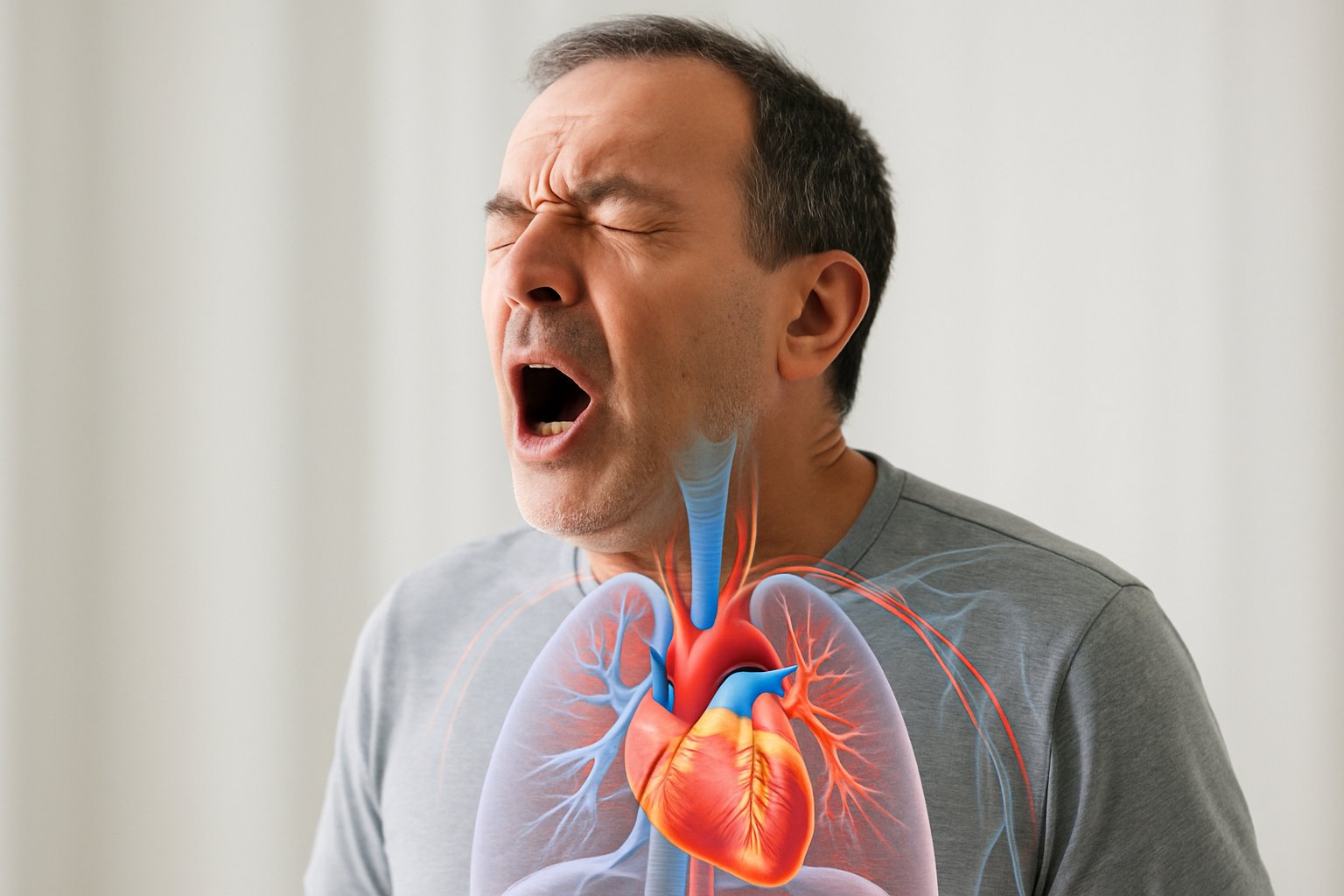
The sneezing reflex follows a precise sequence that involves multiple body systems working together. This process creates significant changes in chest pressure, engages various muscle groups, and effectively clears irritants from the respiratory system.
Stages of the Sneezing Reflex
The sneeze begins when irritants enter the nasal passages and trigger specialized nerve receptors. These receptors send signals to the brainstem, which controls the sneeze reflex.
Stage 1: Detection Nerve endings in the nose detect foreign particles, allergens, or irritants. The trigeminal nerve carries these signals to the sneeze center in the brainstem.
Stage 2: Preparation The person takes a deep breath, filling the lungs with air. The soft palate drops down and the tongue rises, partially blocking the throat.
Stage 3: Build-up Pressure builds in the chest as air becomes trapped in the lungs. The body prepares for the explosive release that follows.
Stage 4: Release The diaphragm and abdominal muscles contract violently. Air rushes out through the nose and mouth at speeds up to 100 miles per hour.
Muscular and Respiratory Involvement
Multiple muscle groups work together during a sneeze to create the force needed to expel irritants. The diaphragm plays the most important role in this process.
The diaphragm contracts sharply, creating the primary force behind the sneeze. Abdominal muscles also contract to increase pressure in the chest cavity.
Respiratory muscles in the chest wall help build and release pressure. The intercostal muscles between the ribs assist in the rapid expulsion of air.
Key muscles involved:
- Diaphragm (primary muscle)
- Abdominal muscles
- Intercostal muscles
- Throat muscles
- Facial muscles
The eyes typically close automatically during sneezing. This protects them from particles and droplets that get expelled during the process.
Impact on Nasal Passages and Airways
Sneezing creates dramatic pressure changes that affect the entire respiratory tract. These changes help clear irritants but also impact normal breathing patterns temporarily.
The nasal passages experience a sudden rush of air that removes mucus, dust, and other particles. This clearing action helps protect the lungs[2] from harmful substances.
Pressure effects include:
- Increased chest pressure during build-up
- Rapid pressure release during expulsion
- Temporary changes in airflow patterns
The airways benefit from this natural cleaning mechanism. Sneezing removes bacteria, viruses, and allergens that could otherwise travel deeper into the respiratory system.
However, suppressing a sneeze by pinching the nose can be dangerous. This forces the built-up pressure back into the airways and can potentially damage the eardrums or blood vessels.
Common Causes and Triggers of Sneezing
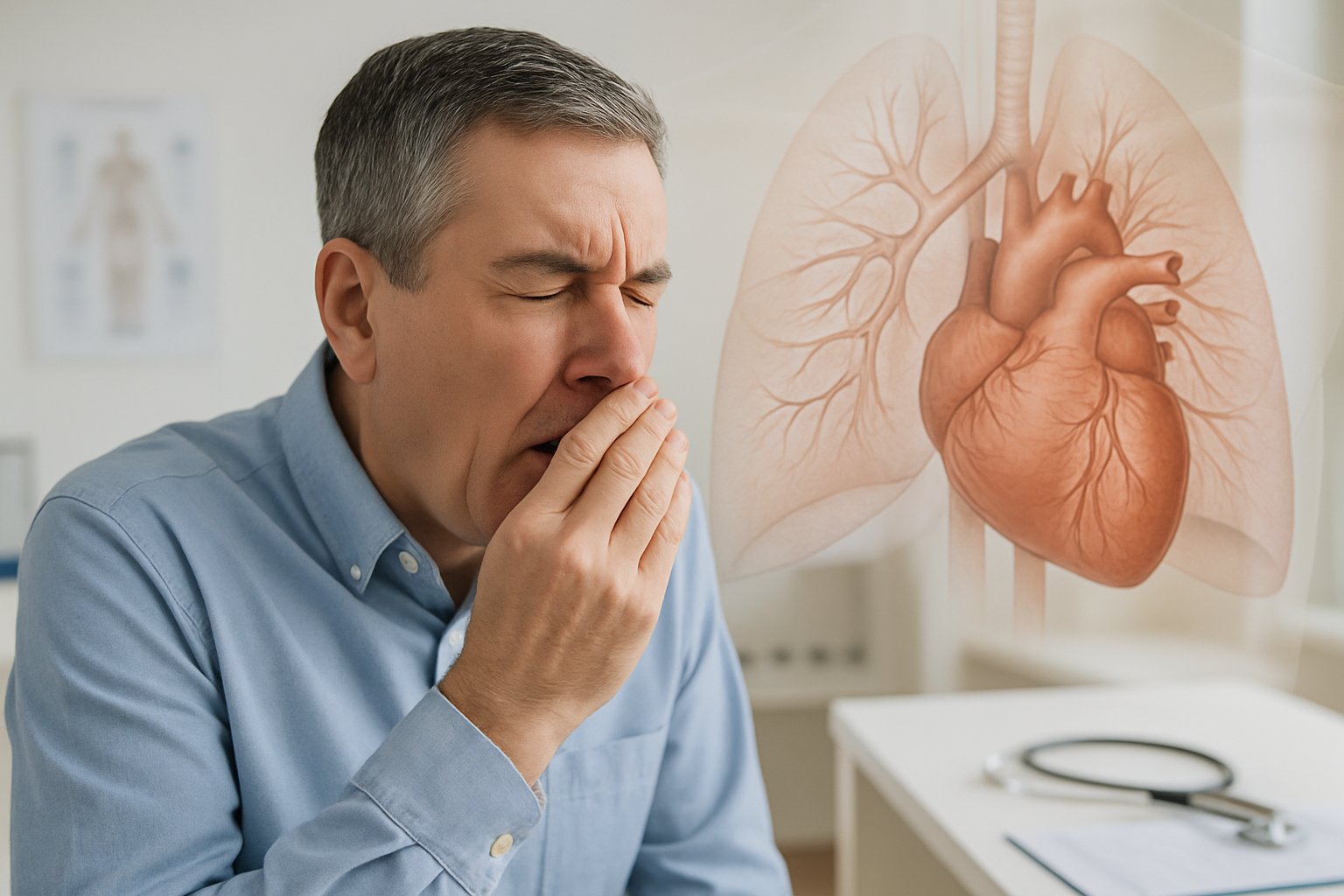
Sneezing happens when the body reacts to irritants in the nose and airways. The most common triggers include dust and pollen from the environment, allergens that cause allergic reactions, and viral infections like the common cold.
Environmental Irritants and Particles
Dust is one of the most frequent triggers for sneezing. It contains tiny particles from fabric, skin cells, and other materials that float in the air.
Pollen from trees, grass, and flowers causes seasonal sneezing. Spring and fall bring higher pollen counts that irritate sensitive noses.
Other environmental irritants include:
- Strong perfumes and scents
- Cleaning chemicals
- Cigarette smoke
- Air pollution
- Pet dander
Bright sunlight can also trigger sneezing in some people. This happens when light suddenly hits the eyes and sends signals to the nose.
Irritants work by tickling the sensitive lining inside the nose. The body responds by forcing air out quickly to clear away the bothersome particles.
Allergies and Allergens
Allergic rhinitis affects millions of people worldwide. It happens when the immune system overreacts to harmless substances called allergens.
Common allergens that cause sneezing include:
- Tree pollen (oak, maple, birch)
- Grass pollen
- Ragweed pollen
- Dust mites
- Mold spores
- Animal fur and dander
An allergy creates inflammation in the nose and airways. This makes the tissues swollen and extra sensitive to triggers.
People with allergies often sneeze multiple times in a row. They may also have a runny nose, itchy eyes, and congestion.
Allergens can be seasonal or year-round. Indoor allergens like dust mites and pet dander cause problems all year long.
Viral Infections and Illnesses
The common cold is a leading cause of sneezing. Viral infections irritate the nose and throat as the body fights off germs.
Viral infections that commonly cause sneezing include:
- Rhinovirus (most common cold virus)
- Influenza (flu)
- Respiratory syncytial virus (RSV)
- Adenovirus
A viral infection creates inflammation in the nasal passages. This makes them more sensitive and likely to react with sneezing.
Cold-related sneezing usually comes with other symptoms. These include a runny nose, sore throat, and mild fever.
Viral infections spread easily through sneezing. Each sneeze can release thousands of tiny droplets containing germs into the air.
Rare Cardiac Events Related to Sneezing
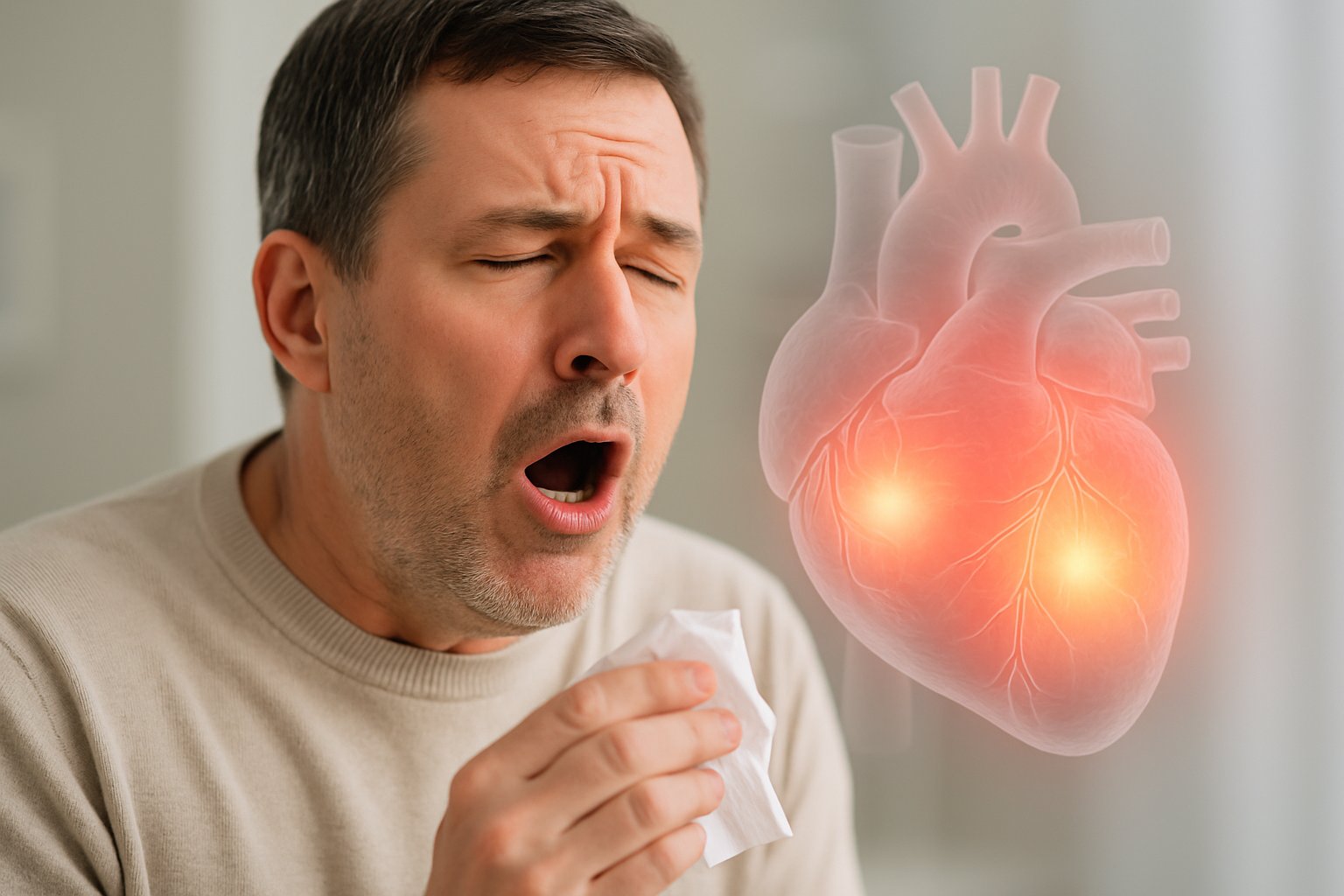
While sneezing typically causes only minor changes in heart rhythm, some people may experience fainting or complications if they have existing heart problems. These events are uncommon but important to understand.
Sneeze Syncope
Sneeze syncope refers to fainting during or after sneezing[2] due to a sudden drop in blood pressure. This happens when the violent action of sneezing causes both blood pressure and heart rate to fall quickly.
The brain needs steady blood flow to function properly. When blood pressure drops too much, the brain doesn’t get enough oxygen and the person faints.
Risk factors for sneeze syncope include:
- Low blood pressure (hypotension)
- Taking blood pressure medications
- Dehydration
- Standing for long periods
This type of fainting is called situational syncope. Other activities that can trigger it include heavy lifting, straining on the toilet, or playing brass instruments.
Underlying Heart Conditions
People with certain heart problems may experience more noticeable effects when they sneeze. The pressure changes during sneezing can affect how well the heart pumps blood.
Heart conditions that may be affected include:
- Atrioventricular (AV) node problems – These can cause irregular heart rhythms
- Structural heart defects – These make the heart work harder during pressure changes
- Heart valve disorders – These can worsen with sudden pressure shifts
Cardiology experts note that healthy hearts easily adjust to sneezing. However, damaged hearts may struggle to return to normal rhythm quickly.
The vagus nerve controls both breathing and heart rate. When sneezing compresses this nerve, it can temporarily slow the heart rate in people with existing heart rhythm problems.
When to Seek Medical Attention
Most people never need medical care for sneezing-related heart effects. However, certain symptoms require immediate attention from a doctor or cardiologist.
Seek emergency care if sneezing causes:
- Fainting or near-fainting
- Chest pain that doesn’t go away
- Severe dizziness
- Heart palpitations that last more than a few seconds
See a doctor soon if you notice:
- Feeling lightheaded every time you sneeze
- Unusually fast or slow heart rate after sneezing
- Shortness of breath that continues after sneezing stops
People taking heart medications should tell their doctor if they experience any unusual symptoms during sneezing. Blood pressure medications can increase the risk of fainting during sudden pressure changes.
Anyone with known heart problems should discuss sneezing symptoms with their cardiology team during regular checkups.
Protecting Your Heart and Managing Sneezing Episodes

Good sneeze hygiene and trigger management help reduce the frequency of sneezing episodes. These steps can minimize potential heart rate changes that occur during forceful sneezes.
Practicing Good Sneeze Hygiene
Never suppress a sneeze once it starts. Holding back a sneeze creates dangerous pressure in the chest and head. This trapped air can cause serious injuries to the ears, throat, or blood vessels.
The safest approach involves covering the nose and mouth properly. Use a tissue or sneeze into the upper sleeve rather than hands. This prevents germs from spreading while allowing natural pressure release.
Keep nasal passages clear through regular gentle nose blowing. Blocked passages often trigger more forceful sneezes that create greater pressure changes. Clean nostrils reduce the intensity of each sneeze episode.
Stay hydrated to maintain healthy mucus consistency. Thick, sticky mucus irritates nasal tissues more than thin secretions. Proper hydration keeps passages comfortable and reduces sneeze frequency.
Tips to Minimize Sneezing Triggers
Common allergens cause most frequent sneezing episodes. Dust mites, pet dander, and pollen are primary triggers for many people. Regular cleaning removes these particles from living spaces.
Use air purifiers with HEPA filters in bedrooms and main living areas. Change filters monthly during high pollen seasons. Keep windows closed during peak allergen times.
Indoor trigger management includes:
- Washing bedding in hot water weekly
- Vacuuming carpets twice weekly
- Dusting surfaces with damp cloths
- Maintaining humidity between 30-50%
Avoid strong scents like perfumes, cleaning products, or air fresheners. These irritants can trigger sneezing in sensitive individuals. Choose fragrance-free products when possible.
Outdoor precautions help during allergy seasons. Check daily pollen counts before planning activities. Shower and change clothes after spending time outside to remove allergens from hair and skin.
Frequently Asked Questions
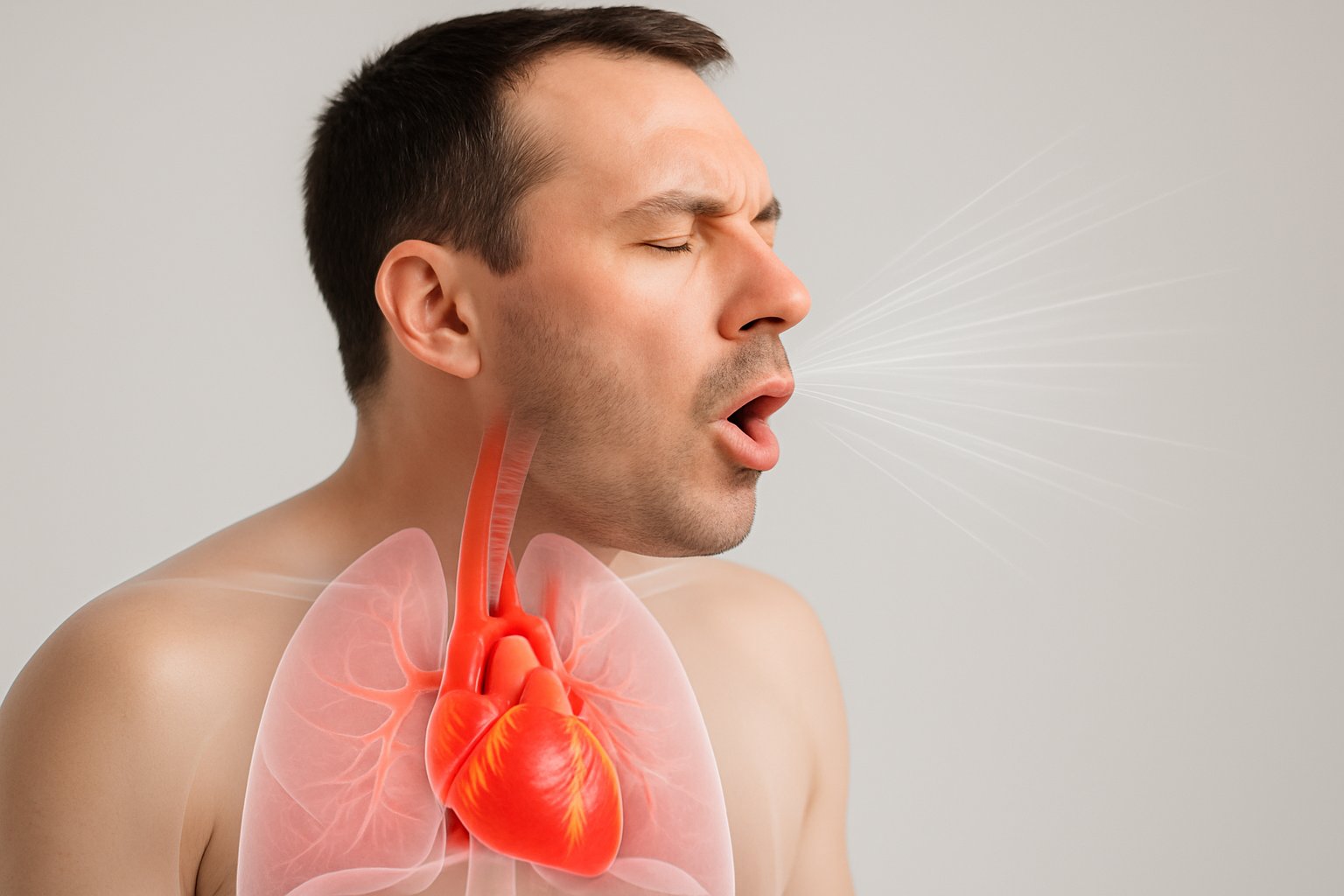
Sneezing causes temporary changes in heart rhythm through increased vagal tone and altered chest pressure. The heart briefly slows but does not actually stop, and these changes pose no risk to healthy individuals.
Does sneezing have any impact on the heart’s rhythm or function?
Yes, sneezing does impact heart rhythm temporarily. Sneezing can slow the heartbeat for a very short time[1] due to increased vagal tone.
The vagus nerve plays a key role in this process. When activated during a sneeze, it sends signals that briefly slow the heart rate.
This rhythm change lasts only seconds. The heart quickly returns to its normal beating pattern after the sneeze ends.
How does the sneeze reflex affect cardiac activity?
The sneeze reflex creates sudden changes in chest pressure. These pressure changes affect blood flow returning to the heart temporarily.
During a sneeze, the chest cavity compresses forcefully. This compression reduces the amount of blood flowing back to the heart for a brief moment.
The heart compensates by adjusting its rhythm. The heart’s rhythm becomes momentarily thrown off-kilter[1] but continues pumping throughout the process.
Is the notion that your heart stops during a sneeze scientifically accurate?
No, this common belief is not scientifically accurate. The heart doesn’t really stop during a sneeze[1].
Medical experts define heart stopping as a pause lasting at least 3 seconds. Sneezing does not cause these clinically significant pauses.
Heart monitors that record activity for years show no meaningful pauses during sneezing. The heart continues beating throughout the entire sneeze process.
What physiological changes occur in the heart during a sneeze?
The heart rate decreases slightly during a sneeze. This happens because the vagus nerve becomes more active and sends slowing signals.
Chest pressure increases dramatically during the sneeze. This pressure change affects how blood moves through the cardiovascular system.
Changes in chest pressure and capacity affect heart rate and blood flow[2]. The heart experiences a brief rhythm alteration that immediately corrects itself.
Blood pressure may fluctuate momentarily. These changes are normal and do not harm healthy hearts.
Can repetitive sneezing pose any risks to cardiovascular health?
Repetitive sneezing poses no significant cardiovascular risks for healthy individuals. The heart easily handles these brief rhythm changes.
People with existing heart conditions should monitor their symptoms. However, normal sneezing episodes do not typically worsen heart problems.
Very rarely, some people experience sneeze syncope. This condition causes fainting or dizziness when sneezing due to extreme drops in heart rate and blood pressure.
Sneeze syncope is very rare even among people who have syncope in general[1]. Anyone experiencing fainting during sneezes should consult a doctor.
What is the origin of the cultural practice to ‘bless you’ after sneezing in relation to heart function?
The practice of saying “bless you” stems from ancient beliefs about the heart stopping during sneezes. People thought the soul could escape or evil spirits could enter during this vulnerable moment.
Historical cultures believed sneezing temporarily separated the soul from the body. They developed blessings as protection against spiritual harm during this perceived pause.
Medical knowledge now shows these fears were unfounded. The heart continues functioning normally during sneezes, making the original concern unnecessary.
Despite scientific understanding, the social custom persists today. Many cultures maintain this polite tradition even though the medical basis proved incorrect.
References
- Does Your Heart Stop When You Sneeze?. https://health.clevelandclinic.org/does-your-heart-stop-when-you-sneeze Accessed October 21, 2025
- Heart rate changes during sneezing. https://www.verywellhealth.com/does-your-heart-stop-when-you-sneeze-7369439 Accessed October 21, 2025
- Debunking the Myth: Does Your Heart Stop When You Sneeze?. https://readnewsblog.com/debunking-the-myth-does-your-heart-stop-when-you-sneeze/ Accessed October 21, 2025
